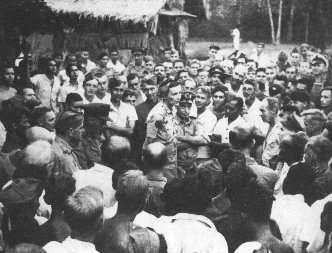
On 15 august 1945 at 00.00 hrs ceasefire was declared, Japan had officially capitulated. That morning all the prisoners were told that there would be no work done, except some maintenance on the line. Also volunteers were asked for to help with a special meeting. This turned out to be a ceremony, where the last nail was hammered in and the declaration that the railway was officially opened. A gold coloured nail was used for this.
More than 8000 prisoners lost their lives during the construction. The ceremony lasted half an hour and afterwards, the volunteers were also given a drink and a biscuit.
Back in the camps rumours were rife, but still no official announcement. That night during roll call the camp commander made the following speech:
"Now the railway is finished, thanks to all your efforts, I have the honour to announce in the name of His Highness the Emperor of Japan, that all of you will be given a rest. Shortly you will be transported to a better place. And from today the rations of rice, vegetables and meat will be increased. You will receive these new rations as soon as we receive fresh stock. At this moment we don't have meat or vegetables and only rice for a few days. While waiting for transport, you are not permitted to leave the camp."
That was all. No word about a capitulation or the end of the war.
From then on, most of the guards kept away. You could leave the gate unhindered, but where could you go?
Finally between 24 august and 30 august, the prisoners from all the camps along the railway were transported by train to Pakan Baroe.
On 31 august during roll call, Lt. Visser stepped in front of the turned out prisoners and announced: "Today is the 31 st of august and the birthday of Queen Wilhelmina, lets all sing the "Wilhelmus" (Dutch national Anthem). One, two, three....." But no one dared. So he started to sing by himself and when the guards didn't react, one by one the prisoners joined in.
Then something unbelievable happened. One of the guards stood up, laid down his sword and saluted the prisoners. Now, finally they knew without a doubt that they were free! The same day a flag was made and flown from a mast.
Now their own officers took charge of the camp, but initially the Korean guards remained as security, until some clothing arrived and they were disarmed and the security of the camp was transferred to the prisoners.

At last more and more food arrived, which caused a run to the latrines. Their bodies could not cope with the increase of the diet.
One day a plane flew over the camp and dropped a torpedo shaped container, which crashed through one of the huts. Fortunately no one was hurt! But to their disappointment it didn't contain any food. Instead to their surprise they found stacks of magazines and boxes of sanitary napkins. A lot of good they could do for an entirely male population. Soon after that more drops were made and this time the long awaited goods arrived.

Lady Mountbatten arrives in Pakan Baroe

Lady Mountbatten visits one of the camps
Early in September the first badly sick were flown to hospitals in Singapore and on 15 September Lady Edwina Mountbatten, wife of Chief Commander Admiral Mountbatten, in the function of Head of the St. John's Ambulance, arrived for an inspection of the camps.
The liberation is a moment none of the prisoners would ever forget. They cried, laughed, prayed and cursed all in their own way. But some are to sick or dying and can't absorb the change. Others are to apathic or to bitter to be able to react spontaneous.

The first sick evacuated

Not much more than a skeleton.
After the visit from Lady Mountbatten 0n 15 and 16 September, the worst sick are flown to Singapore . Soon the British and American prisoners followed, but it was still waiting for the Dutch prisoners. They had to stay where they were. This created a lot of resentment.
In the meantime the politic situation outside the camp worsens and the republic orientated Indonesians (Sukarno sympathisers) refuse all cooperation with the ex prisoners. For camp security some three hundred volunteers under command of captain F.B. van Straalen. Officially the security was still in the hands of the Japanese, but this was not very satisfactory. So the problem was arming the volunteers. Finally a cache of weapons, left by the Japanese on the nearby Island of Djamoer, was found and also a Dutch ship carried a load of arms. All of this was done in secret, as it was against the orders of the Supreme Allied Commander.
In the end only a few weapons were handed out and the rest safely stored away. The guards were given weapons, but no ammunition. The risk of a confrontation with Indonesians was to high.
Also the prisoners were transferred from camp1 to camp2, because this camp was easier to defend if required.
At last the evacuation begins at the end of November and the last group leaves on 25 November.
Only a hand full remain behind with major C.P. Langley for an other few days to try to organize something with the Japanese for the romushas.
As a personal note:
My mother received the first message
from my father on the 27th of October, to say that he was alive and in
Pakan Baroe. My father stayed in hospital for some time. After he had sufficiently
recovered physically he was prevented to return to his family in Java,
because as he was a teacher, he was required to open a school in
Palembang. He finally was reunited with us on 12 March 1946.![]()